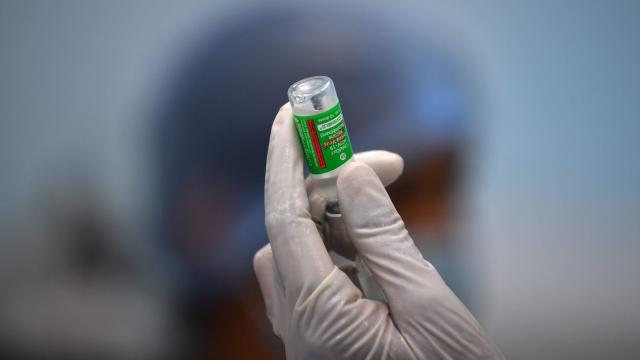As expected, the European Union’s health regulators are standing behind the covid-19 vaccine developed by AstraZeneca and Oxford University. In a press conference today, officials with the European Medicines Agency said that their investigation has found no link between the vaccine and a higher overall risk of blood clots. And while the EU does plan to continue studying the vaccine’s possible connection to a rare blood clotting disorder, its experts are still calling it “safe and effective.”
Two weeks ago, Austria was the first country to voice concerns after two reports of blood clotting in women who had recently gotten a dose of the two-shot vaccine. Before long, multiple countries in the EU, as well as Asia and South America, suspended their campaigns over these concerns. Meanwhile, the UK — the first to authorise the vaccine last December — maintained that it found no evidence to support such a link in the data and that it would continue to use the vaccine.
[referenced id=”1679866″ url=”https://gizmodo.com.au/2021/03/the-astrazeneca-vaccine-cant-catch-a-break/” thumb=”https://gizmodo.com.au/wp-content/uploads/2021/03/16/rvzfx2s3ftkxcx1r8vel-300×168.jpg” title=”The AstraZeneca Vaccine Can’t Catch a Break” excerpt=”The covid-19 vaccine jointly developed by AstraZeneca and Oxford University is once again running into trouble. On Monday, Germany, France, and Italy became the latest countries to suspend their rollout of the vaccine over concerns that it may increase the risk of blood clots. However, many experts and regulators say…”]
Following these concerns, the EMA scrambled together their Pharmacovigilance Risk Assessment Committee to evaluate the safety data collected from these countries and to make a recommendation on the vaccine’s continued use within the EU. At a press conference Tuesday, EMA chief Emer Cooke was unequivocal.
“The committee has come to a clear scientific conclusion: This is a safe and effective vaccine,” she said. “Its benefits in protecting people from covid-19 with the associated risks of death and hospitalisation outweigh the possible risks.”
Cooke went on to state that the committee “also concluded that the vaccine is not associated with an increase in the overall risk of thromboembolic events or blood clots.”
Several countries in Europe have cited the possible increased risk of particularly severe and rare clotting conditions as their rationale for suspending the vaccine’s use. In Germany, there have been at least seven reports of recently vaccinated individuals developing cerebral venous thrombosis, a life-threatening condition that plugs up the vein that drains blood away from the brain. Out of these seven cases, three have died (for context, at least 720,000 people in Germany have received the AstraZeneca vaccine as of early March, while over 72,000 have died of covid-19.)
Some experts have said that there are plausible explanations for how the vaccine could have contributed to these injuries, such as by causing an abnormal immune response. But no one, including the EMA, is sure whether these cases are actually caused by the vaccine or not.
“After days of in-depth analysis of lab results, clinical reports, autopsy reports and other information from the clinical trials, we still cannot rule out definitively a link between these cases and the vaccine,” Cooke said.
Cooke also relayed the committee’s suggestions on how to tackle this possible risk moving forward.
“What the committee has therefore recommended is to raise awareness of these possible risks making sure that they’re included in the product information, drawing attention to these possible rare conditions,” she said. “We’re also launching additional investigations to understand more about these rare cases, and we’re conducting targeted observational studies.”
Above all, Cooke emphasised the need for mass vaccination, as many countries in the EU are facing renewed waves of the pandemic.
“I want to reiterate that our scientific position is that this vaccine is a safe and effective option to protect citizens against covid-19,” she said.
The EMA has since sent out a statement about their findings, which include the precautions people who receive the vaccine should take. People who experience symptoms like swelling or coldness in an arm or leg, severe or worsening headache or blurred vision after vaccination, or persistent bleeding after vaccination should seek prompt medical attention and mention the vaccine, they state.
Meanwhile, the U.S. announced Thursday that it is now planning to send 4 million doses of their unused AstraZeneca supply to its neighbours Mexico and Canada. The U.S. trial of the vaccine is still ongoing and it’s expected that a decision on its authorization will arrive within the next few months.
